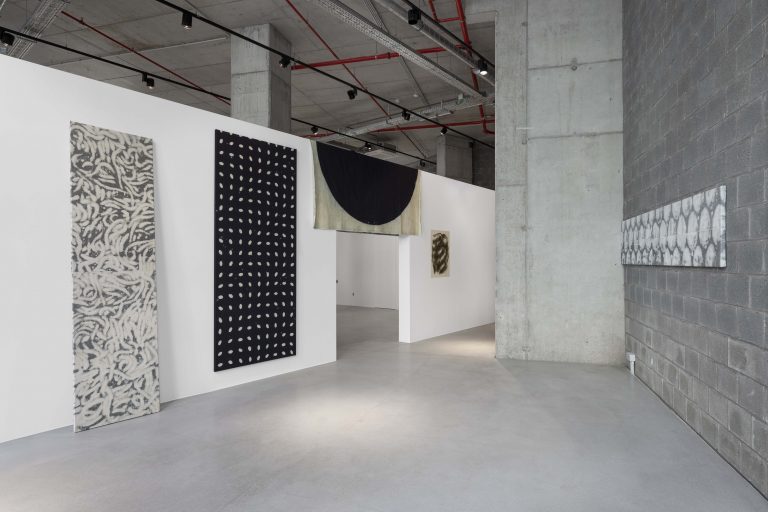Michael Van den Abeele “and amputate myself from every function” at Kin, Brussels
Sloughing the swamp
Purchase the bag, open the bag, eat what’s within the bag. Then flip the bag inside out, reveals its inside and show its body. In “and amputate myself from each operate,” Michael Van den Abeele unites chip baggage, bleached denim, fingers, an iPhone video suspended inside an aluminium construction and a single watercolour in a singular nearly mannerist rhapsody. It’s a tendency that we will see in fingers that belong to no hand or to the ornate association of chip baggage. Mannerism was a creative fashion that borrowed from essential understandings of type born and canonised within the Renaissance. At its peak, proportion, steadiness and wonder had been its holy trinity.
However the Mannerists had been much less satisfied, favouring decadence and abundance over relative type, they had been drawn to exaggeration. They prioritised asymmetry, magnificence that was unnatural and environments constructed across the spectre of artifice. On this pursuit, they christened the chances of type past its goal and disposed of useful illustration by the hands of one thing much less knowable, extra ornamental: a brand new drama.
Emancipating operate from type is a recurring motif in Michael Van den Abeele’s creative apply. Usually, he begins with a fabric so wedded to its financial worth that their separation comes with tough situations. The flat iron is bored with working, the denims take depart from the area of workwear and switch to decoration. In a single movement, Van den Abeele unlatches the commodity from the throes of its market and ushers it into a brand new enviornment the place eros, extra, and mythology prevail. Right here, the potential for a given factor renews itself in need, decadence and a romance for discernible issues.
Nonetheless, it’s with some hesitancy that Van den Abeele approaches the potential for complete renewal. Reasonably than dancing in duplicity, he exaggerates the potential for their decor however prolongs their present corporeality. Whether or not by way of bleaching or publicity, the picture produced is commonly a characteristic of subtraction. Already hereditary to its host, its substance is a minus—however one which involves characterize an economic system of insides the place essential organs have misplaced their operate and their technicality is translated into a brand new object of need. Optical illusions, pasta squiggles and imperfect eggs turn out to be mirrors in a funhouse, they distort our sense of actuality however intend on maintaining a playful view.
Final time we noticed Van den Abeele, he was dealing in cupids, remedy and cowboys. This time, the script favours a extra florid inclination. The denims drop their operate in favour of decoration, the chip baggage beam like low-cost jewelry, the fingers not belong to the hand, the flat iron turns into conscious of its personal picture. Elsewhere, an aluminium sculpture revokes the telephone from the hand, and returns the picture to us by way of a sliced mirror suspended at a forty five diploma angle: the efficiency of social media suspended in slap-stick. Collectively, their previous lives as on a regular basis commodities turn out to be monuments of need and deficit and their materiality is made concrete in a vernacular idiom that may by no means turn out to be utterly out of date.
Maybe the standard that involves outline its contemporaneity is patented within the method to type that favours substance. Although this new physique of labor is self-governed and delicate, it negotiates with the principles of consumption that reign over our epoch. Van den Abeele’s works spotlight the situations of its manufacturing at a time when our capability to stay useful is our principal worth. Within the last act, the parable of productiveness turns into camp, the concept chip baggage, flat irons, telephones, and even cats could possibly be topics of utility turns into laughable and what’s left is cultivated into one thing fully—and unproductively—“cultural.”
—Micaela Dixon, 2024
at Kin, Brussels
till June 11, 2024
Source link








Michael tuttle says: